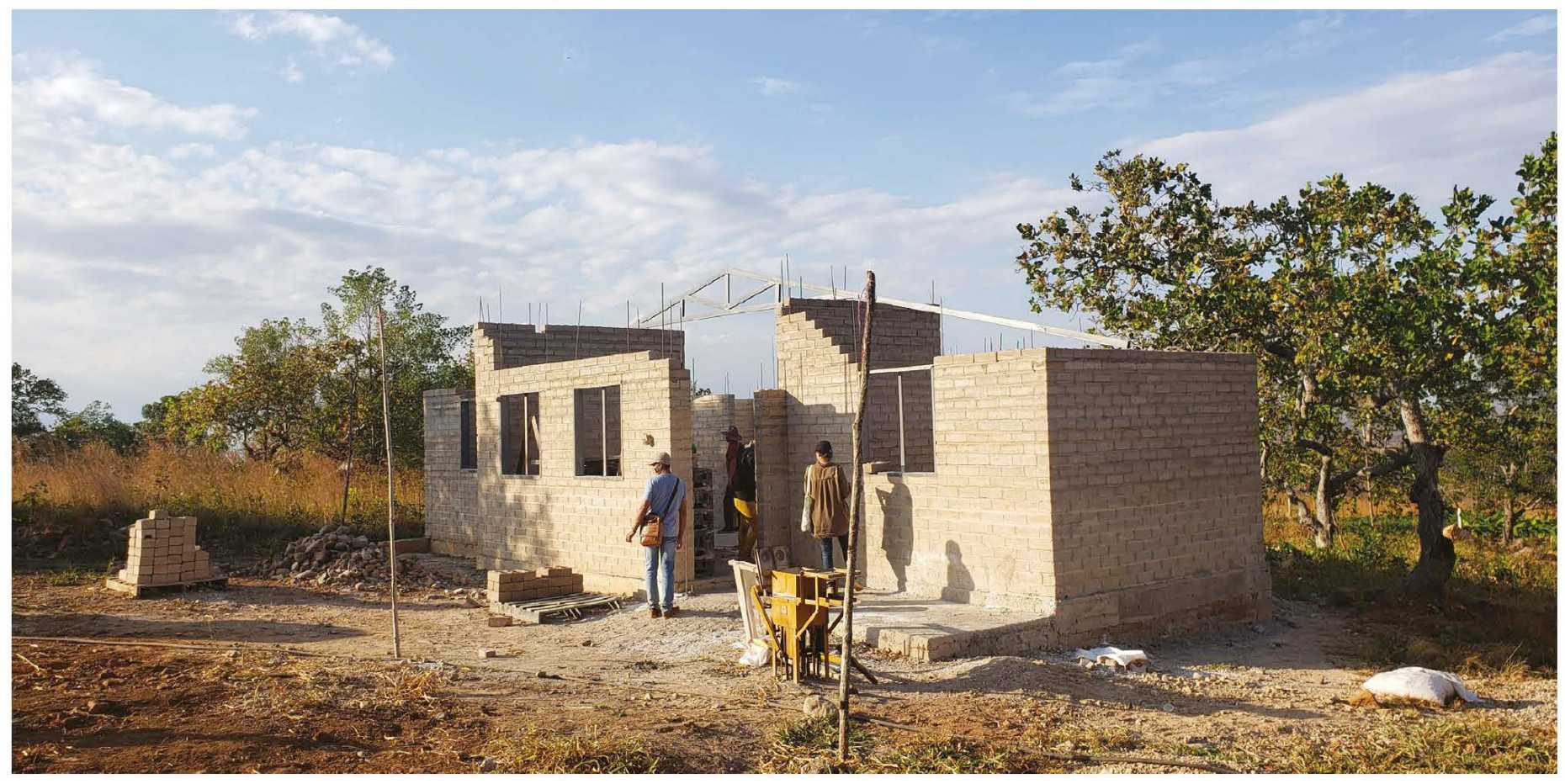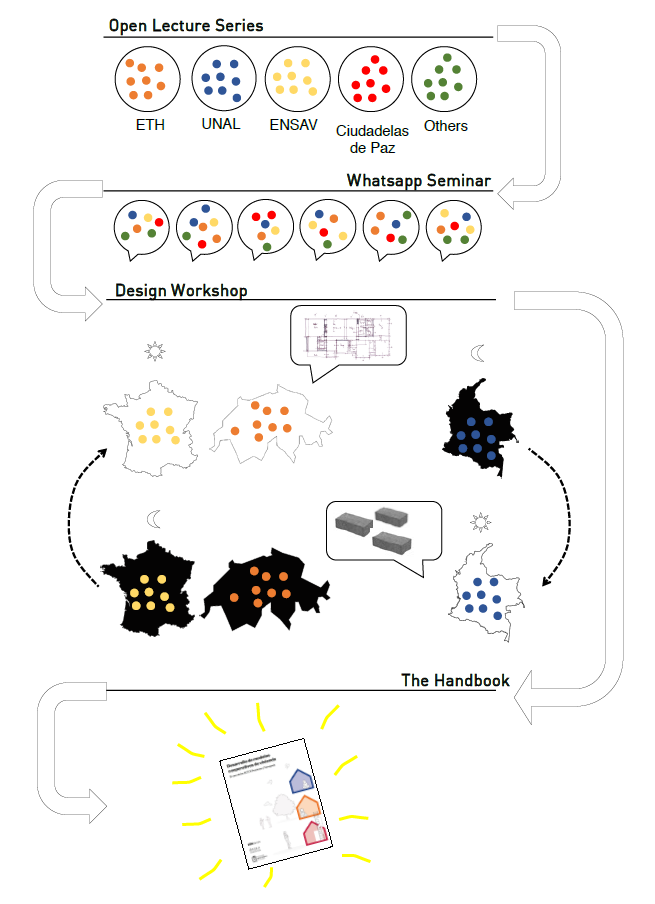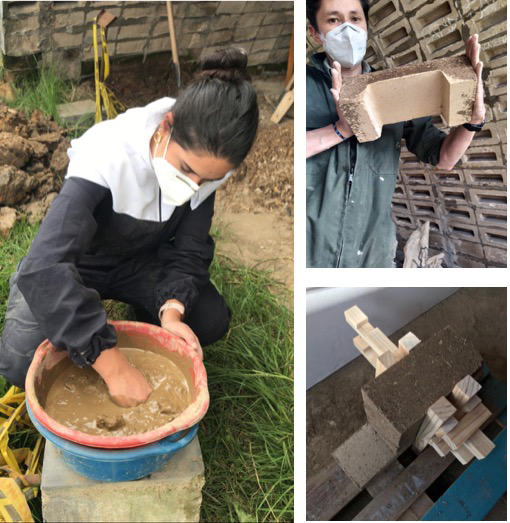The School of Architecture for Reconciliation
The School of Architecture for Reconciliation took place between January and May 2021 and was organized by the MAS ETH in Housing in collaboration with the Universidad Nacional de Colombia (UNAL) with participation from the École Nationale Supérieure d'Architecture de Versailles (ENSAV). The online School brought together an international community of scholars, policy makers, architecture students, victims of armed conflict and former combatants currently developing the project Ciudadelas de Paz, a mutual-aid housing cooperative as part of their reintegration process. It combined elements of a design studio and reflections on social, organisational and legal aspects of housing cooperatives.

Implementation of the course during the time of distance learning
Course Structure
Phase 1. Open Lectures (23.02.21- 06.04.21)
The School was launched with a series of online lectures by international and local scholars, housing experts, and practitioners aiming at defining the key concepts and the core values of cooperative housing with reference to global definitions and academic debates. The lectures further analysed the legal framework for this type of housing model in Colombia, and the potential replicability of the pilot project Ciudadelas de Paz to address the national housing crisis. Participants included a wide range of actors such as architecture students, ex-combatants, representatives of victims of the civil war, policy makers, and representatives from international organisations and NGOs.
Phase 2. WhatsApp Seminar (23.03.21-16.04.21)
WhatsApp thematic working groups were established to create a dialogue between communities living in remote areas of Colombia and students in Zurich, Bogota and Paris. Through a combination of texts, fotos, videos and voice notes, design and construction issues were discussed in a virtual participatory process. Architecture students together with the community on the ground were able to identify specific architectural and construction challenges and develop adequate solutions through a collective design process.
Phase 3. Design Workshop
• Faced with challenges of bringing together a multi-local international group spread across two continents and three countries with different and changing Covid restrictions, the School capitalized on the difference in time zones and access to university facilities;
• Students in Switzerland and France designed architectural details and delivered instructions for the construction of 1:1 prototypes to the students in Colombia. Based on the challenges encountered in this process they gave feedback to the students in Europe until -after several iterations- an ideal solution could be found. All communication took place through the collaborative platform Miro.

• The School took advantage of the time difference between Europe and Colombia, which allowed to work around the clock; while students in Colombia were sleeping, in Europe they were producing designs of architectural details and instructions for their construction. Every evening these were passed to the students in Colombia, who were just beginning their day. During the night in Europe, students in Bogota built prototypes, documented the process and delivered detailed feedback in the evening in Colombia, hours before students in Europe would begin their day and continue the process. Daily debriefing sessions were arranged with all groups to exchange thoughts and reflections and make collective adjustments to the workshop plan and objectives.
• Additionally, in order to inform the design process with real life challenges, participants were in permanent contact with communities through the ongoing thematic WhatsApp working groups.
Phase 4. The Handbook
• By bringing together different actors, the School was able to create a network of actors interested in the replicability, not only of the cooperative model, but also of the School´s methodology as a participatory technical assistance platform. The output of the School is a Handbook with detailed instructions on construction and design elements and serves as a tool for the replicability of the model. It was presented to the community the 16 September 2021 and has been praised by a wide range of stakeholders, not only as a valuable contribution to technical assistance, but also as a tool for policy advocacy.
Course description
Overall concept of the course before the pandemic - during - after
The Seminar Week forms an essential part of the MAS ETH in Housing. In ‘normal’ times provides an opportunity to visit a country in the Global South, learn about its national housing system and strategies, visit projects, and meet with local stakeholders and communities. Additionally, the seminar week offers students the opportunity to reflect upon contextually appropriate housing solutions. Past MAS seminar weeks have taken place in India and Mozambique and were evaluated by students as life-changing experiences.
The pandemic posed us with the challenge of offering an equivalently rich experience to the current MAS students while socially distancing from home. Together with the Universidad Nacional de Colombia (UNAL) and with the participation of the École Nationale Supérieure d'Architecture de Versailles (ENSAV), the MAS ETH in Housing developed the School of Architecture for Reconciliation, an international exchange bringing together an international community of scholars, policy makers, architecture students, victims of armed conflict and former combatants currently developing the mutual-aid housing cooperative Ciudadelas de Paz. Faced with the challenges of bringing together a multi-local international group of people spread across two continents and three countries with different Covid restrictions, the School capitalized on the different time zones and access to university facilities.

The teaching methodology for the School emerged from a response to challenges in terms of inability to travel, distance learning, different time zones, and diverse languages and disciplines. However, the School turned all these challenges into opportunities for an intense collaboration. Indeed, the final outcome would not have been possible in a traditional set-up. For us, this school served as a pilot project that we plan to further develop beyond Covid times, for example in the framework of other interdisciplinary and international teaching and research projects. Moving forward, we envision incorporating a combination of an in-person fieldtrip within the framework of the seminar week complemented with online exchanges with different actors through an extended period of time resulting in the co-production of knowledge and culturally appropriate solutions to current challenges in our field.